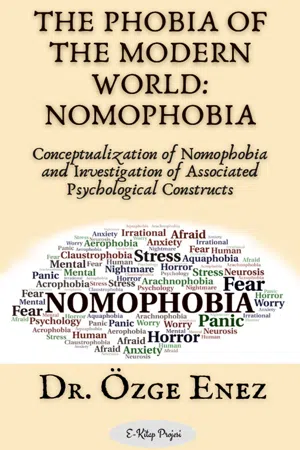
The Phobia of the Modern World: Nomophobia
"Conceptualization of Nomophobia and Investigation of Associated Psychological Constructs"
Dr. Özge Enez
- English
- ePUB (handyfreundlich)
- Über iOS und Android verfügbar
The Phobia of the Modern World: Nomophobia
"Conceptualization of Nomophobia and Investigation of Associated Psychological Constructs"
Dr. Özge Enez
Über dieses Buch
In the modern world, the mobile phone has become an indispensable part of modern life. On the one hand, the mobile phone allows maintaining interpersonal contacts and fulfilling work or school duties regardless of time and location. It enables individuals to plan their daily routines and their free times. On the other hand, a mobile phone is a tool that can cause several psychological and physical problems. Nomophobia, which is considered the phobia of the modern era, is only one of these problems. In the simplest terms, nomophobia is the fear of being without a mobile phone and the intense anxiety and distress experienced in the absence of a mobile phone. Although technological addictions such as smartphone addiction and internet addiction have been studied extensively in the psychology literature, it is striking that nomophobia is a neglected psychological problem. However, nomophobia is emerging as a common phenomenon among young adults, as most young adults use the mobile phone for about 5 hours a day. Some users define the mobile phone as a friend and the meaning of life. More importantly, prevalence studies have revealed that about half of young adults suffer from nomophobia. Since nomophobia causes many serious consequences such as physical pain, social problems and a decrease in academic achievement, nomophobia studies are important and beneficial especially for the younger generation.
This book has been written to emphasize the importance of nomophobia and to provide detailed information about the diagnosis, treatment, prevalence, predictors and symptoms of nomophobia. In addition, this book aimed to conceptualize nomophobia theoretically. Also, based on the theoretical conceptualization, psychological structures that can cause nomophobia have been identified. The theoretical conceptualization has been tested and validated using scientific methods. This book, which contains a comprehensive literature review and scientific research, can shed light on researchers for future nomophobia studies. I also believe that this book will make valuable contributions to the clinical field by providing a better understanding of the factors that should be considered in prevention programs and treatment interventions developed for nomophobia. I hope that scholars, clinicians, and students from a variety of disciplines will find my efforts helpful. Lastly, I would like to express my deepest gratitude to my supervisor Prof. Dr. Özden Yalç?nkaya Alkar for her constant support, advice, and understanding during my doctoral process.
Dr. Özge ENEZ
ABOUT AUTHOR:
Özge Enez, PhD, graduated from Istanbul University, Department of Psychology in 2009. Özge completed her master's degree in clinical psychology at Queen Mary, University of London in 2013 and her doctorate in psychology at Ankara Y?ld?r?m Beyaz?t University in 2021. Since 2014, she is a faculty member at the Department of Guidance and Psychological Counselling, Giresun University, Turkey. Özge has extensive experience in teaching at the university. Since 2014, she has been teaching undergraduate courses such as Child Psychology, Interpersonal Communication, Developmental Psychology, Psychological Counseling Skills. Her research area is Clinical Psychology and her research interests are smartphone addiction, nomophobia, grief, death, psychopathology, and emotions.
Häufig gestellte Fragen
Information
CHAPTER 1. INTRODUCTION
1.1. Nomophobia
1.1.1. Definition of Nomophobia
Inhaltsverzeichnis
- LIST OF ABBREVIATIONS
- LIST OF TABLES
- CHAPTER 1. INTRODUCTION
- CHAPTER 2. THEORETICAL CONCEPTUALISATION OF NOMOPHOBIA
- CHAPTER 3. TESTING THE NOMOPHOBIA MODEL
- CHAPTER 4. DISCUSSION
- CHAPTER 5. CONCLUSION
- 6. REFERENCES